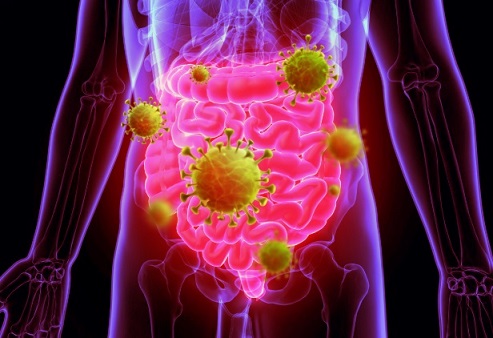French Study Finds That SARS-CoV-2 Preferentially Infects Intestinal Cells Causing Barrier Damage and Potential Systemic Spread
Nikhil Prasad Fact checked by:Thailand Medical News Team Feb 12, 2025 2 months, 5 days, 57 minutes ago
Medical News: New Findings on How SARS CoV 2 Infects the Intestinal Tract
A new study has uncovered critical insights into how SARS-CoV-2, the virus responsible for COVID-19, infects intestinal cells and compromises gut integrity. Researchers from Aix-Marseille University, Institut de Recherche Pour le Développement (IRD), Assistance Publique Hôpitaux de Marseille (APHM), and the Centre National de la Recherche Scientifique (CNRS) in France conducted a detailed investigation using lab-grown intestinal cell models. Their findings suggest that SARS-CoV-2 primarily enters intestinal cells through the apical, or upper, surface, which is the side facing the gut lumen. This
Medical News report reveals that this mode of entry leads to significant damage to the intestinal barrier, potentially allowing the virus to spread further into the body.
 French Study Finds That SARS-CoV-2 Preferentially Infects Intestinal Cells Causing
French Study Finds That SARS-CoV-2 Preferentially Infects Intestinal Cells Causing
Barrier Damage and Potential Systemic Spread
Understanding the Experiment
To better understand the dynamics of intestinal infection, scientists used a specialized laboratory model consisting of human intestinal cells (Caco-2 and HT29 cell lines) grown on membrane inserts. These cells were exposed to the virus from either the apical (upper) or basolateral (lower) side to observe which route led to more efficient infection. The study found that the virus strongly prefers to infect cells from the apical side, leading to a faster and more robust viral replication. Importantly, the virus caused clear signs of cell layer damage, including reduced expression of key cell adhesion molecules, increased permeability, and disruption of the tight junctions that keep the gut barrier intact.
Implications of the Findings
The study’s results suggest that when SARS-CoV-2 enters the intestines, it can directly infect cells lining the gut. This damage allows the virus to move beyond the gut and potentially enter the bloodstream, spreading to other organs.
Researchers observed that infected cells showed lower levels of crucial proteins such as E-cadherin and occludin, which play key roles in maintaining the structure and function of the intestinal barrier. The virus also led to decreased electrical resistance across the cell layers, indicating a loss of integrity in the gut lining.
What This Means for COVID 19 Patients
These findings align with clinical observations that many COVID-19 patients experience gastrointestinal symptoms such as diarrhea, nausea, and abdominal pain. The fact that the virus can persist in the gut for extended periods, even after respiratory symptoms have subsided, may help explain some cases of long COVID.
Scientists believe that the intestinal epithelium could serve as a viral reservoir, prolonging inflammation and contributing to persistent symptoms in some individuals.
Potential Pathways for Viral Spread
One of the key take
aways from this study is that SARS-CoV-2 may spread from the intestines into the bloodstream through either a direct transport mechanism within cells (transcytosis) or by bypassing damaged cell junctions. When the virus infects through the apical surface, it eventually reaches the lower chamber of the experimental setup, suggesting that it can traverse the intestinal lining. The exact mechanisms behind this movement remain unclear, but researchers suspect that the breakdown of tight junctions allows the virus to slip through the gaps between cells.
Long Term Implications and Future Research
The study’s results raise important questions about how gastrointestinal infection contributes to the severity of COVID-19 and whether gut health influences disease progression. Given that the gut plays a significant role in immune function, a damaged intestinal barrier could allow more pathogens to enter the bloodstream, exacerbating the disease. Additionally, the findings suggest that monitoring and supporting gut health could be crucial in preventing severe complications from SARS-CoV-2 infection. Future research will focus on understanding how long the virus can remain in the gut and whether treatments targeting the intestinal barrier could help mitigate symptoms in patients with long COVID.
Conclusion
This study provides valuable evidence that SARS-CoV-2 preferentially infects intestinal cells through the apical side, leading to significant barrier damage. This could have major implications for how the virus spreads within the body and contributes to prolonged illness. By understanding these mechanisms, scientists hope to develop better strategies for managing and preventing severe gastrointestinal complications in COVID-19 patients.
The study findings were published in the peer-reviewed journal PLOS ONE.
https://journals.plos.org/plosone/article?id=10.1371/journal.pone.0313068
For the latest COVID-19 News, keep on logging to Thailand
Medical News.
Read Also:
https://www.thailandmedical.news/news/children-face-long-term-gastrointestinal-issues-after-covid-19-infection
https://www.thailandmedical.news/news/probiotics-as-a-potential-ally-in-managing-covid-19-gastrointestinal-symptoms
https://www.thailandmedical.news/news/microbiota-dysbiosis-and-serotonin-dysregulation-linked-to-long-covid-gastrointestinal-symptoms
https://www.thailandmedical.news/news/covid-19-news-sars-cov-2-infected-children-show-persisting-gastrointestinal-symptoms-over-18-months-lactoferrin-helps
https://www.thailandmedical.news/articles/coronavirus
